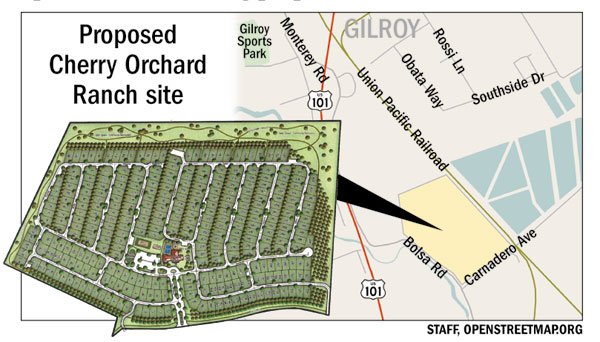The City of Gilroy is bracing for possible legal action from a developer who claims the city has violated his due process rights by delaying hearings over a 349-unit housing project proposed for a south Gilroy cherry orchard.
The City of Gilroy is bracing for possible legal action from a developer who claims the city has violated his due process rights by delaying hearings over a 349-unit housing project proposed for a south Gilroy cherry orchard.
In January, the city chose to put hearings related to the affordable housing development meant for seniors on hold until the city’s new housing plan was certified by the state and the developer, CW Development Company, reimburses the city for normal legal fees related to the project, City Administrator Tom Haglund said.
But Bill Cusack of CW Development Company said the city needs his project to meet affordable housing standards, and the city shouldn’t shut him out while it waits for the state to approve the housing plan.
“We don’t feel like it’s reasonable to delay us because of it,” Cusack said.
In a July 11 letter to City Attorney Andrew Faber, Philip R. McCowan, the developer’s attorney, claims that the issue regarding attorney’s fees could be solved through mediation, and it was no reason to also delay the hearings.
McCowan also asks the City Council to instruct the City of Gilroy Planning Commission to hear CW Development’s application during a July 28 or Aug. 12 meeting.
“That’s not going to happen,” Haglund said.
City Planner Stan Ketchum said the cherry orchard project was “in a holding pattern,” until the city receives confirmation from the state, which should take no longer than 60 days.
Haglund said the housing plan contained statuses of housing and affordability of housing within Gilroy. Based on that, the state’s housing department will identify how Gilroy might be able to meet its regional housing needs.
“I don’t know if what they sent to the state will be acceptable, but I don’t imagine so,” Cusack said.
Cusack has maintained that Gilroy has failed to fulfill the state’s affordable housing requirements and should take on any projects to help satisfy them.
City Councilman Perry Woodward, a partner in the San Jose law firm Terra Law, LLP, said he believed the city was in compliance with state law, but added that legal action with the developer was “unavoidable.”
“Mr. Cusack is orchestrating this so that it will result in legal action,” Woodward said. “He’s trying to force us to accept a bad plan by taking advantage of some delays in Sacramento.”














